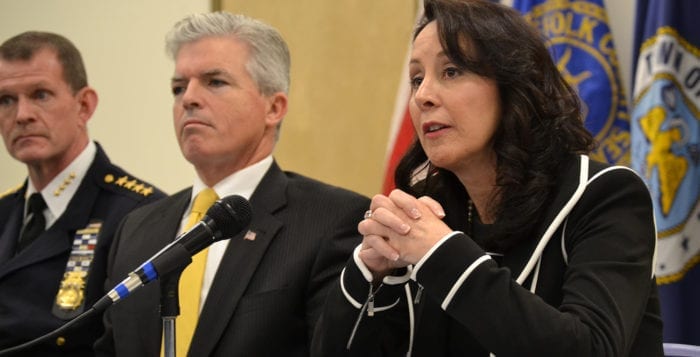Q&A with SC Police Commissioner Geraldine Hart on Ongoing Pandemic

Suffolk County Police Commissioner Geraldine Hart spoke by phone to TBR News Media about the ongoing police response to the pandemic.
TBR: How have you reassured people during the pandemic?
Hart: When the Governor issued the stay at home orders, that was the public perspective of uncertainty. Once we had a high visibility presence in our communities, a lot of the anxiety level started to dissipate. With the unexpected and uncertainty that was out there in the communities, we wanted to make sure we were still connecting, making sure we were still a visible presence to everybody, which includes different types of outreach. I have been on the phone with the Chambers of Commerce, making sure they understand all the efforts we are taking to make sure their businesses are safe.
TBR: What are you doing to protect businesses?
Hart: We are working on two fronts. We are getting the calls coming in through 311 to our department of people who are seeing businesses that are non compliant or who are seeing suspicious activity in those areas. Those numbers are high. We also have proactive policing in those areas. The order has gone out that [officers] need to proactively check on all these businesses. The officers know the precincts the best. They make sure they are dropping by businesses and making sure there is no disruption, no break ins, broken glass, nothing to indicate there’s been a break in. They are going to record that.
TBR: Crime has decreased.
Hart: It is true. It bears out. Commercial burglaries are down significantly since the March 22 order went into effect. The high visibility of police officers out in the precincts and on the streets is important and it’s paying off.
TBR: Is there anxiety among police officers?
Hart: From the beginning, we have messaged that it’s important to the department that we ensure the safety and health of the officers. By doing that, we’ll ensure the safety and health of our communities. We took steps looking back to January of making sure everyone has the [Personal Protective Equipment] they need.
TBR: How do officers protect themselves?
Hart: They have the n95 masks and they have the medical, surgical masks as well, with the understanding that the burn rate is high on these. The direction to them, if they are encountering someone who is confirmed COVID-19, they need to don the n95 mask. If they are taking someone into custody who has the potential [to be infected], they should have that individual wear a surgical mask so they are not infecting our officers.
TBR: If someone in custody gets in a car, should that person wear a mask?
Hart: if the prisoner is thought to have symptoms or exhibit any signs of COVID-19, they should be wearing a mask.
TBR: What about those people who are asymptomatic but infectious?
Hart: The hope is that they would wear a mask. The officers can’t social distance with a prisoner, even if they are asymptomatic. The guidance would be, if possible, have the prisoner wear a medical mask.
TBR: Have you been vigilant about domestic abuse as people remain confined to their homes?
Hart: Reports of domestic violence continue to receive the same response. It’s always a mandatory 911 … It’s always a priority in our department. In Suffolk County, [people can] text to 911, if they are near a person who is the offender and can’t make a phone call safely. We want to message that and get that out.
TBR: Have the police been on the lookout for any hate crimes in connection with the virus?
Hart: We have a very significant hate crimes unit, which has a number of detectives assigned to it. I met with them to see if there’s anything specific they need to bring to my attention. I haven’t seen that to date.
TBR: The rate of infection among Suffolk County police officers is considerably lower than in New York City, which reported a 20 percent infection rate. How has the Suffolk County Police Department kept that rate down?
Hart: New York City has its own challenges as far as the density of the population. They have challenges to deal with, versus Suffolk, where people are spread out.
TBR: What are the police doing to help the communities?
Hart: We are looking for all those opportunities. We initially, when the school shut down, were reporting to schools for breakfast and lunch curb side. We had our community officers there to help with that. We had never done that before. It wasn’t in place. We thought it was a good opportunity to get out in the community and help where we could.
TBR: Have officers raised any funds for groups or people who need it?
Hart: They are delivering meals, and the [Police Benevolent Associations] and unions went to hospitals with meals for health workers. All our organizations are plugged in, veterans and fraternal are doing it as well, as are Cops Who Care. We are making sure we are identifying those people who are in need with food and different things.
TBR: Do you have enough staff?
Hart: Each day, I’m briefed on staffing levels. We assess it. We have made adjustments accordingly. We have not been outside the patrol bureau. We don’t have to bring in other units. We are prepared to with a continuity of operations plan. If we see more infections [among officers], we will bring other commands.
TBR: How is the mental health of the officers?
Hart: We are making sure we are connecting. We have peer teams at each level. They have unions, a peer support team, which are critical. They are out there working together and are able to observe somebody who might be having a tough time in getting the support they need. There’s a great [resource] with EAP and Chaplain Program, led by Stephen Unger.
TBR: How are you doing?
Hart: We have pushed a lot of things to teleconferencing. We jam pack everything in [to the schedule]. I don’t have to travel anymore. It’s a fantastic command staff. Everybody really is working together. We say that as a cliche, but it’s absolutely true here. Chief [Stuart] Cameron is well versed in all sorts of terrorism situations and homeland security, active shooter training. We have tremendous resources and are coordinating a lot of efforts. All our division chiefs have a wealth of knowledge through many emergency situations. This one is different, bringing that experience, making sure we are sharing that information, with a priority of officer’s health and safety.
TBR: Has anyone in your command staff tested positive?






